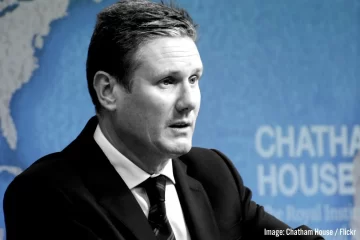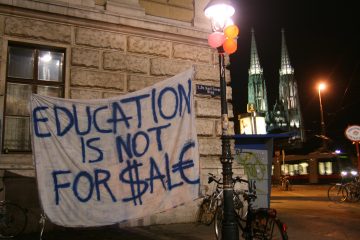Below is the document that is guiding the work of the MSF in 2015. It was discussed, amended and passed by the MSF conference in February 2015.
——————————————————-
The last six years have been the beginning of the most turbulent period in human history. On a global scale we have entered into a period of secular stagnation thanks to the global capitalist crisis of overproduction. This requires attacks on the working class and the youth in order to keep capitalism alive. The result is the development of class consciousness which is increasingly expressing itself in working class and youth movements around the world.
The struggle of workers and youth does not proceed in a straight line. Mass movements today can be sparked by small events that would not play a significant role in the class struggle in previously normal times. These events can act as “the straw that breaks the camel’s back”, so to speak. The powerful undercurrents of anger and disillusionment in society, once they reach a certain level, are rising to the surface and rapidly transforming into mass movements.
International class struggle
In the USA the murder of black teenager Michael Brown by a white police officer sparked demonstrations in cities throughout that country and abroad. These intensified when a grand jury decided that the shooter would not face trial for his actions. People, particularly black youth, feel hemmed in on all sides by racism, police intimidation and little economic future. The movement was an expression of this class anger.
In Mexico the kidnap of 43 trainee teachers by the police and their handover to a drug cartel was part of the state’s response to the radicalisation of students in that country and the recent movement against moves to privatise education. The state’s actions led to an intensification of the movement in Mexico and internationally. The organised working class has also joined this struggle because the movement is an expression of the crisis of the whole regime in Mexico, which has been carrying out a vicious programme of capitalist counter-reforms over the past few years with the backing of Western imperialism.
Last summer protests against the World Cup in Brazil were caused by the enormous expense of hosting the tournament while attacks on health, education and infrastructure were intensified. These protests built on the demonstrations in 2013 sparked by an increase in bus fares. These are expressions of the class struggle which will continue to intensify in Brazil as its economy weakens.
Last Autumn students in Hong Kong staged a one week strike which energised the previously vacillating Occupy Central movement demanding basic democratic rights. A movement for genuine democracy is a threat to the power of the Hong Kong capitalists who operate a financial hub for the international bourgeoisie. Inequality and a lack of social mobility are the cause of problems and anger in Hong Kong and the pro-democracy movement is a partial expression of this although the liberals in the movement are doing everything to stop the students and workers joining forces in this struggle.
In Spain the meteoric rise of Podemos from nothing to the top of some opinion polls in just 10 months proves that this party is the political expression of the radicalisation of youth and workers through the Indignados movement of 2011. The crisis of European capitalism has hit Spain particularly hard, especially the youth who face over 50% unemployment, resulting in this expression of their desire for change.
The attacks on the offices of the Charlie Hebdo magazine in Paris are the direct result of Western imperialism’s adventures in the Middle East in the past period. We must stand firm against the scourge of religious fundamentalism of all shades, and we recognise that the discrimination, oppression and capitalist exploitation experienced by young Muslims in countries like France and Britain is the chief recruiting agent for reactionary organisations such as the Islamic State. Right-wing politicians such as Le Pen and Farage, and the leaders of jihadist groups across the world feed off each other. They are two sides of the same coin whose divisive ideas we must counter with those of unity of the international working class.
There are many examples of class movements around the world. The economic situation is fragile and the social situation is extremely volatile. The development of consciousness can take place through varied channels depending on the concrete situation in a particular country at a particular time. We cannot predict exactly how or when movements of workers and youth will break out, but we can understand that in the present crisis of capitalism such movements are inevitable and will intensify in the future.
Class struggle in Britain
This applies in Britain too. In Scotland radicalised layers of youth have been attracted to the Radical Independence Campaign following the referendum vote thanks to the pro-independence campaign’s anti-establishment image. In England and Wales the anti-establishment anger has not yet found an expression among the working class and the youth but the popularity of Russell Brand’s “revolutionary” politics and the 5,000 strong demonstration for free education last year are small indications of what is going on beneath the surface.
The recent Scottish referendum was a reflection of the anti-establishment sentiment that exists all over Britain and in Scotland found a distorted expression through nationalist ideas. We fully defend the democratic right of people to self-determination, but we also say that neither an independent capitalist Scotland, nor a capitalist United Kingdom solves any problems for working class people. The struggle of the Scottish workers and youth, whether inside or outside Britain, remains the proletarian struggle against capitalism and for socialist revolution.
The anger in Britain is being compounded by the fact that the economy is slowly growing (albeit on an unstable basis) and yet inequality is increasing and the living standards of ordinary people continue to fall. As Cameron says, “the warning lights are flashing on the dashboard of the global economy” and Britain cannot isolate itself from this. He is warning that Britain faces another economic crisis around the corner – this “recovery” is as good as things are going to get.
Thus the attacks on the NHS, welfare, working conditions and living standards will continue to intensify. This impacts the working class as a whole, but particularly the youth who have no future to look forward to. Students as well as working youth are hit hard by the crisis as they see privatisations, cuts and fees in education.
In Britain the movement against the increase in tuition fees in 2010 that mobilised tens of thousands of students in demonstrations and occupations up and down the country were a sign of encouragement to the workers. A demonstration against austerity and cuts to public services including universities was called by the unions. The demonstration of 26 March 2011 brought together 500,000 workers and was the biggest trade union demonstration in almost two decades. Even though the weak leadership of the students and labour organisations failed to maintain the momentum, this is one example of how important the role of students in sparking and supporting the struggle of the working class can be.
The student movement, like the labour movement, remains on a low level at the present time. The biggest obstacle to the development of class struggle is, ironically, the leaders of those organisations which are supposed to represent the interests of students and workers, such as unions. The careerist and reformist layer of bureaucrats at the tops of these organisations are unwilling and unable to mobilise the members to demonstrate, strike and change society. Trade union leaders have deescalated and avoided strike action despite no concessions being won, while the President of the National Union of Students withdrew support from the demonstration for free education last November on the grounds of health and safety. This is not because workers and students are not willing to fight but because their so-called leaders are afraid to lead them into battle.
In reality, if we are to defend our education, current standards of living and our future, we have to engage in class struggle, not collaboration with the Tories and the bourgeoisie whose only hope of saving the system upon which they survive is to attack workers and youth. Our struggle has to take aim at the root cause of our problems: private ownership and the pursuit of profit. In a word, the problem is capitalism.
For this reason only the organised working class, thanks to the position they occupy in the productive process, can secure victory in this struggle. It is those people who work for a wage who really run the economy – without them nothing would function – and so it is them to whom we must look as being capable of taking the economy under genuine democratic control thus eliminating private ownership and profit.
For this reason students must link their struggle with that of the working class, as has been done to varying degrees in Mexico, Hong Kong and elsewhere. This is the only way in which we will be able to fight for international socialist revolution.
The role of Marxist students
Marxist students in Britain must be alert to movements and events that express the anger that exists in society today. Our task is to intervene in these events and bring the class question to the fore. Students at school and university face burdens of debt, insufficient financial support while they are studying, and decreasing quality of education. Young people in general face an intolerable housing situation, particularly in London; zero hours contracts and other precarious working conditions; and cuts to income support, housing benefit and other welfare protection. Any and all of these issues (and many more) could be the spark for a major movement of the youth and Marxist students must energetically intervene in events surrounding these factors.
It is becoming apparent that now in Britain, and internationally, the education (not explicitly, but primarily) of young people is being commodified. Where education should be a universal right, with universities making their primary purpose the education of their students, universities and higher education institutions are tying themselves in with multinational corporations for profit. This is indicative of the crisis of capitalism, and as Marxist students we must challenge these relationships, and create an awareness of this abuse of education in relation to capitalist crisis.
We have intervened in the Mexico solidarity action in Britain and made important links with the Mexican student population in this country. Several Marxist societies have passed resolutions in their student unions and called rallies and demonstrations in conjunction with the Mexico Solidarity Campaign. The societies have also held stalls on campus to inform students of the situation in Mexico and have taken solidarity photos with the Mexican students. These initiatives have been useful in raising the profile of the Marxist Student Federation and further initiatives with this campaign should be pursued.
Several Marxist students in London have intervened in the Ferguson and #blacklivesmatter protests in Britain with leaflets and makeshift placards. The interventions have been small due to the short notice at which the demonstration was called, a fact which proves the need to be alert to developments and be flexible in how we approach them. This was a good initiative and, again, raised the profile of the MSF.
In both these events, our ideas, literature, and active presence have been well received. In the Ferguson and #blacklivesmatter demonstrations, many other demonstrators asked to take photos of the makeshift placards brought by the comrades, which carried the Malcolm X quote, “You can’t have capitalism without racism”. The Mexico Solidarity Campaign has been similarly welcoming, in some areas even bulk-buying Marxist pamphlets analysing the situation in Mexico in order to sell them at their society meetings. It is clear that there is a great thirst for Marxist ideas amongst certain layers of the student movement. The primary task of Marxist students is to connect with these layers.
We have also had interventions in the national demonstrations on the 18th October (TUC Demonstrations) and 19th November (for Free Education). On the first of these, we were probably the largest youth bloc present, at 70 strong. This is indicative of the growing strength of the Marxist Student Federation on a national scale.
The MSF has participated in the recent disputes led by UCU against the planned changes in the pension scheme for university lecturers and staff. Since 2012 the MSF has been active in supporting staff at universities taking strike action, both lecturers striking for their pensions and cleaners for a living wage. All these actions of solidarity should be continued to strengthen the links between the students and workers. By doing this we are building bridges with workers and laying the basis for a united struggle.
Societies should also consider linking up with other student groups on campus. Last term the Newcastle Marxist society held a successful joint meeting with the Newcastle Feminist society. Societies such as the Labour club, the Green Party student societies, and other political groups could be approached for joint meetings or debates, particularly in the run up to the general election.
Marxist students have also discussed and passed resolutions, both internally and in student unions and trades councils, relating to the Pakistani Trade Union Defence Campaign and the Solidarity with the Antifascist Resistance in Ukraine campaign, based on events relating to these campaigns that have taken place this academic year. To help with publicising resolutions like this societies should produce leaflets and posters with the text of the resolution printed on it and information about the campaign and the Marxist society, and how to get involved.
Opportunities will present themselves for campaigns and interventions on a range of topics. Marxist students should always be thinking about whether they can write an article, either for the Federation or the student press; whether they can pass a resolution in the society or the student union; whether leaflets and posters can be produced; and whether a demonstration or rally can be called over the issue. Taking bold initiatives like this is key to the work of the Marxist societies.
The Marxist society at KCL has taken the initiative to draw up and pass a resolution calling on the university to ‘blacklist the blacklisters’, with specific emphasis on construction firms where blacklisting is prevalent. This was done in conjunction with writing an article on the subject of blacklisting for the student press by a member of the society. This resolution can be taken to the student union council, and forwarded on to the local trade union branches in order to build links with them.
The weakness of the NUS leaders proves the need for Marxist ideas in this organisation. Marxist students should seize the opportunity to run for NUS delegate positions as has been done this year so far in UCL, Sheffield Hallam, Bristol and Manchester. Our candidates for election should run on a clear socialist programme which seeks to mobilise as many people as possible on campus in an active campaign based on Marxist ideas. We should be aiming to send dozens of delegates to the NUS conference in the near future.
All of this activity is based on the weekly meetings of the Marxist societies to discuss questions of Marxist theory, which is our guide to action. As Lenin said, “without revolutionary theory there can be no revolutionary movement”. The experience of the left, in Britain and internationally, has shown this to be true time and time again. In order to understand the events in which we are intervening we need to educate ourselves as Marxists in questions of economics, politics, philosophy etc.
For international socialist revolution
Events across the world are causing people, particularly young people, to draw radical and even revolutionary conclusions. These people must be won to the ideas of Marxism, because these represent the only ideas capable of guiding revolutionary change which will solve the problems created by capitalism. This is the task of the Marxist Student Federation – to educate students through through theory and practice in the best way to fight for socialism.
As Marxist students we must seek to spread these ideas across as many campuses in the UK as possible and we welcome applications from all groups who agree with our perspectives to affiliate to the Marxist Student Federation. We must also seek to strengthen our links with youth organisations in other countries who are pursuing the same aims.
Our organisation is still small, but it is growing rapidly. If we are patient, dedicated, enthusiastic and audacious the ideas of Marxism will shape future movements of students and workers in a decisive way and our struggle for international socialist revolution will be successful.



